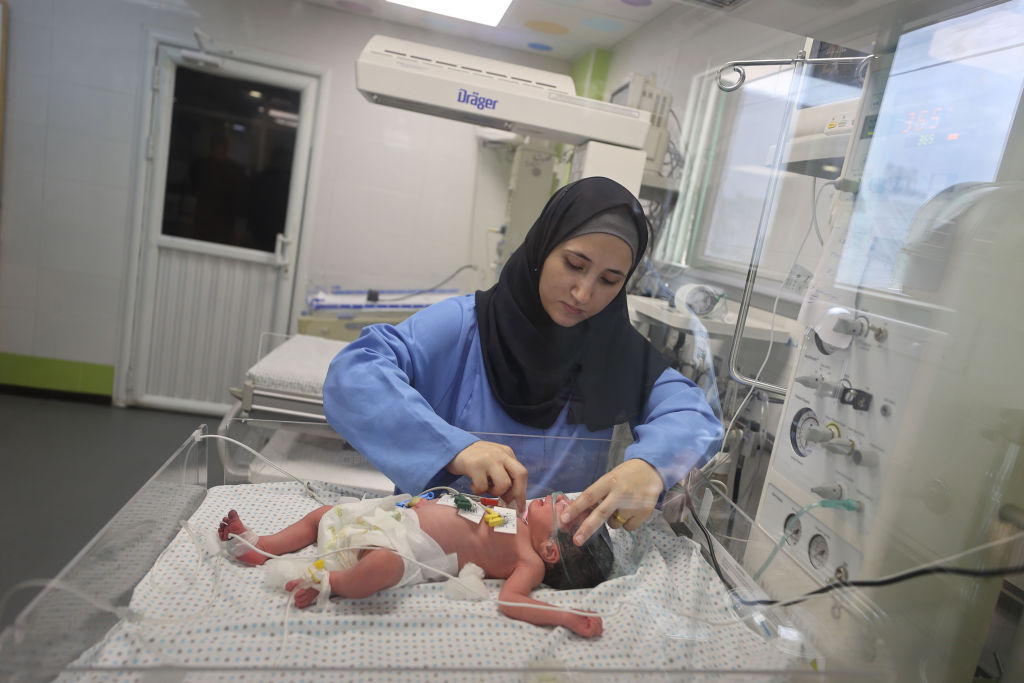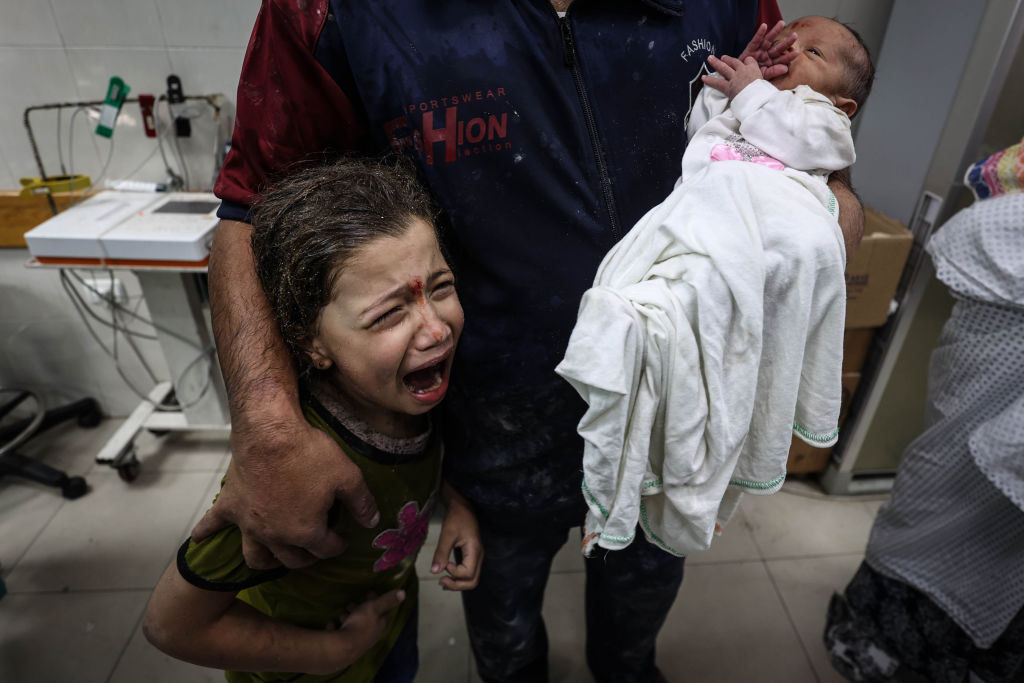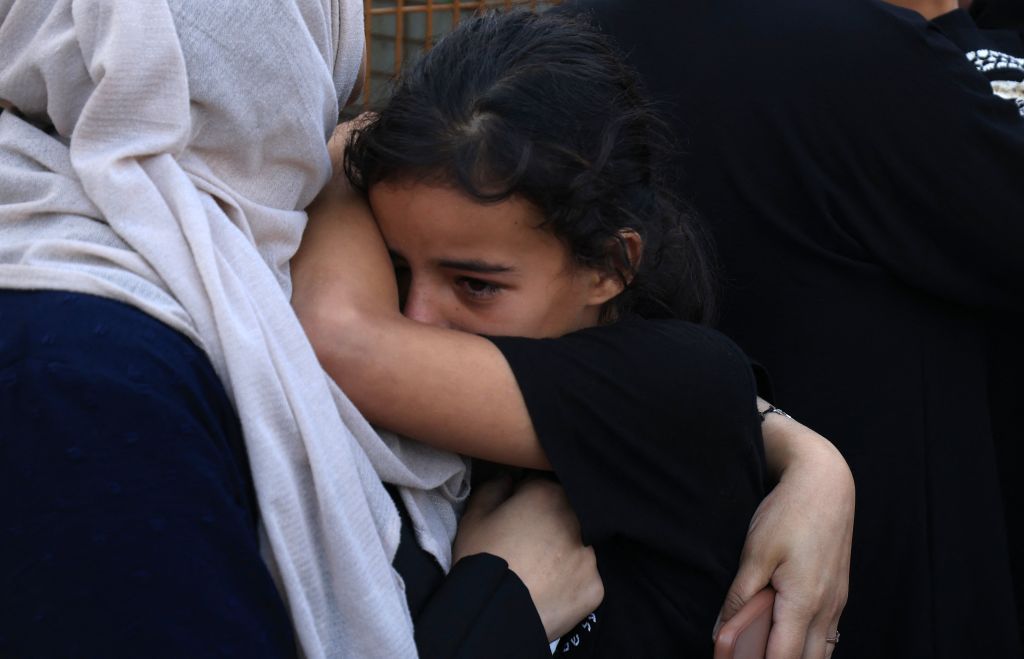Isra Mcdad was two weeks away from giving birth when she had to evacuate for the fourth time. Leaving a safe house in Gaza City, she headed south of the Gaza Strip towards the Rafah border with her family. Just a month earlier, the 33-year-old and her husband were excited to put up new shelves for baby supplies in their three-year-old daughter Sofya’s bedroom. Now, they were taking refuge with three families, or nearly 20 people, in a house without any electricity or water.
As the Israel-Hamas War raged on for its fourth week, Mcdad was overwhelmed trying to figure out how, and where, she could possibly deliver her baby. “I had no idea if our home had been destroyed. The hospital I planned to go to was targeted by an airstrike. And all I could think was, ‘I need to give birth somewhere,’” she recalls to TIME.
Mcdad began experiencing contractions on Oct. 29, “but I was already under so much stress that I couldn’t tell if I was going into early labor,” she says. When the pain in her lower back became more severe the next morning, however, Mcdad rushed to the nearest hospital with her husband and parents. There, the family was turned away. The hospital was at full capacity.
Read More: The Struggle to Save Lives Inside Gaza’s Hospitals
Eventually she was admitted to al-Emirati Hospital, the only maternity hospital still functioning in Rafah City. Before the war, the hospital delivered nearly 500 babies each month, but now, it was overcrowded with pregnant women, many of whom were balancing the anticipation of giving birth with grief over the loss of family members killed by airstrikes. “I was so thankful that I was able to find a hospital,” Mcdad says, “but it was the most intense experience of my life.”
As she entered the operating room, Mcdad began to cry. She pleaded with her doctor: “Please keep me and my baby safe, so that we can go back to my daughter.”

50,000 women in Gaza are pregnant, and more than 160 women are expected to give birth every day, the U.N. Population Fund estimated on Nov 3.
But as the humanitarian crisis inside the besieged territory deepens—over 10,000 civilians have now been killed, 40% of them children, according to Palestinian officials—pregnant women and their newborn children are left to bear the brunt of a healthcare system in a state of total collapse.
More than a third of the hospitals and two-thirds of primary healthcare clinics have shut down due to a lack of fuel, and those still operating are overwhelmed with casualties and grappling with critical shortages of clean water, medicine, and other supplies, the UNFPA reports.
“The situation in Gaza is really, really hard for someone pregnant or about to give birth because the medical system is standing on its knees and racing against time,” says Hiba Tibi, the West Bank and Gaza country director for aid agency CARE International.
Tibi adds that because nearly half the population of Gaza—some 1.1 million people—has evacuated from the north to the south, many pregnant women have lost contact with their prenatal care clinics or their doctors. “They have become displaced, so they cannot continue accessing these medical services,” she says. The group has received many reports from medical personnel in Gaza that pregnant women have no choice but to undergo emergency C-sections without anesthetics.
In Khan Younis, the largest refugee camp for displaced Palestinians in the south of Gaza, Dr. Bassam Zaqqout says he has treated at least two to three pregnant women on a daily basis. The doctor evacuated from his home in Gaza City to the shelter on Oct. 13, and since then, has been working as part of an emergency medical team on site.
“Fear is the common condition of every pregnant woman,” Dr. Zaqquot tells TIME in a phone interview. But without any proper medical equipment or facilities, he says that all he can do is prescribe basic medication and give general advice. “We are trying to do our best, but we don't have treatment or solutions,” he says. “It's a terrible situation. It's very difficult.”

Inside the camp, 42-year-old Lubna Rayyes is expected to give birth to her third child at the beginning of January. Rayyes was already nervous about complications in her pregnancy, but since evacuating with her family from the al-Rimal neighborhood in Gaza City, her fears have only multiplied.
“I’m in my seventh month [of pregnancy] now, but if I suddenly need to deliver my baby, I can’t,” she tells TIME over WhatsApp. “There’s no anesthesia here, and the hospitals don’t have any room for more surgeries.”
And though Rayyes is grateful that she has been safe in Khan Younis during her pregnancy so far, there is also anger. “I just keep thinking, ‘why should I bring my baby into this unjust and unfair world?’” she says.
Dr. Zaqqout says that having access to clean water and toilets has become the most crucial need for pregnant women in Khan Younis. The lack of hygiene has added an increased risk of contracting other infections, he says. “Thousands of people have access to only one bathroom at a time, so you can imagine the situation these women are in,” he says, describing how many line up for nearly two hours to access one bathroom.
“The situation is critical without any water,” says Soraida Hussein-Sabbah, a gender and advocacy specialist based in Ramallah for ActionAid UK. Without water, new mothers face dehydration, which impacts their ability to produce milk to feed their babies, Hussein-Sabbah adds.
Read More: People With Disabilities in Gaza Face Additional Barriers in the Israel-Hamas War
The dire conditions are exacerbating the risk of maternal and newborn mortality. In Gaza, the neonatal mortality rate of 8.8 deaths per 1,000 live births was already disproportionately high—more than double the rate of high-income countries, according to UNICEF. As Gaza now runs out of fuel amid power outages, 130 premature babies in electric incubators in six neonatal units across the Gaza Strip are at severe risk.
Hussein-Sabbah from ActionAid UK adds that amid the scarcity, hospitals are also compelled to treat patients severely wounded from airstrikes before pregnant women. “Inside hospitals, the priority right now is saving the lives of those people who are being taken out from under the rubble,” she says.
But in some instances, the patient is a victim of both tragic circumstances. Dr. Nasser Fouad Bulbul, the head of neonatal care at Al-Shifa Hospital, the largest health facility in Gaza, told UNFPA that he recently performed a premature delivery of a baby “from the mother’s womb while she was dying” after being struck by an airstrike.
“Many of these infants are now orphans. We don't know the fate of their relatives or have any idea about their identities,” he said.

On Oct. 30, Mcdad gave birth to a baby girl after six hours in the operating room. They named her Maria.
“The moment I was able to hear my baby scream, the moment they put her on my skin, that was when I knew that I’m alive and she’s alive,” says Mcdad.
Since then, she has been learning to adjust with two little girls in a house full of people trying to stay alive during the war. Sofya is fond of her baby sister, but she has also learned the Arabic words for "fog" and "bomb" throughout the experience. Basic supplies are scarce, but as a new mother, Mcdad gets priority over access to water, food, and the toilet.
Still, there’s the worry that supplies will soon run out in the house and the store nearby. And though Mcdad is relieved to have her baby with her, she’s now preoccupied with trying to keep her children safe. “Whenever we hear a bomb, me and my husband have one daughter each to cover,” she says.
“We don’t know what will happen, but we just contain them and hug them, hoping for a better tomorrow.”
More Must-Reads from TIME
- Caitlin Clark Is TIME's 2024 Athlete of the Year
- Where Trump 2.0 Will Differ From 1.0
- Is Intermittent Fasting Good or Bad for You?
- The 100 Must-Read Books of 2024
- Column: If Optimism Feels Ridiculous Now, Try Hope
- The Future of Climate Action Is Trade Policy
- FX’s Say Nothing Is the Must-Watch Political Thriller of 2024
- Merle Bombardieri Is Helping People Make the Baby Decision
Write to Astha Rajvanshi at astha.rajvanshi@time.com